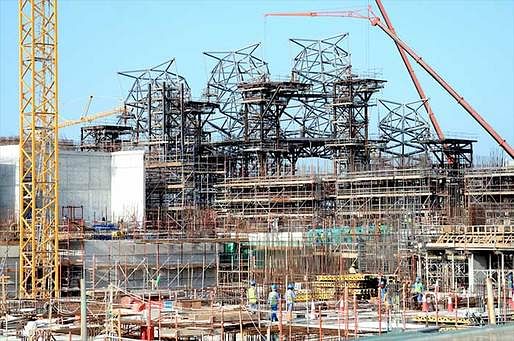

The Louvre Abu Dhabi looks set to open in 2016, as work on Jean Nouvel’s colossal construction speeds up and his vision of a modern medina starts to crystallise on what was once a desert island. This vast project has been stupendously controversial...Abu Dhabi’s new cultural centre is being built by exploited and abused migrant workers...Fifty years from now, when the Louvre Abu Dhabi has established itself as one of the world’s great museums, how clearly will its dark beginnings be remembered? — Jonathan Jones / the Guardian
In Jones' op-ed, he makes a strange case, stating point blank: "Nothing excuses the inhuman working conditions that have been reported." Yet, for him, these "unexcusable" working conditions might produce nothing short of "a revolutionary subversion of the old European imperialism of knowledge." Jones asserts that the world needs a "a network of cultural oases on every continent." And, if this is accomplished, "That would vindicate the democratic educational dream of the Enlightenment, from which the first world museums grew."
I'd imagine, however, that for many of the workers currently locked into de facto slavery, art and culture are the last things they actually need. In fact, they may argue that the resources currently being applied towards the museum could instead be used to pay living wages or to provide for their basic needs. Of course, Jones' point is that these issues shouldn't be mutually exclusive, and that the merits of a museum may outweigh the conditions that brought them into being in the first place (just like the Pyramids have). But we don't live in Ancient Egypt (in fact, almost 5,000 years separate us from the misery of its slaves), we live in a world in which, for a variety of reasons, large art projects and oppressive politics are often provided by the same hand.
It seems to me that there is a confusion implicit in Jones' sentiment: he acknowledges the violence of European imperialism while simultaneously hoping for the "vindication" of its intellectual progenitor (or at least a seemingly benevolent aspect of it, democratic education by means of a European institution). In the process, he mimes the very defenses used to support colonialisms and imperialisms, namely the belief that history will vindicate the spread of "culture," no matter the short-term cost. Jones asserts, "It is right to be concerned about worker abuses. But it would be deeply destructive to refuse for that reason to celebrate an eye-opening new museum."
His central case seems to be that museums have historically been associated with European (and American) cities, which, in a sense, has allowed them to maintain cultural hegemony. Seemingly, when the Louvre constructs an appendage in the Middle East, this history (and present) will be disrupted. But this very sentiment suggests a troubling and pedantic assumption: that by not having museums like those that emerged in Continental Europe in the 18th century, the rest of the world suffers from a fundamental lack. (With the introduction of Occidental institutions, the people of these regions assumedly benefit, perhaps becoming "cultured." This is troublingly akin to the logic behind such projects as the American Indian boarding schools of the 19th-20th centuries.)
Questions remain: How many deaths are acceptable in order for a segment of a (highly segregated) state to have access to fine art? What is more destructive, the lack of something that a region has survived without for centuries (the Louvre's collection of often stolen objects and other objects deemed as fine art), or the actual death of actual humans (like in the case of the 1,000+ workers who have died working of Qatari work sites in 2012-13)?
Another way to say this is: what collection of paintings and sculptures is worth a pile of corpses?
Rather than become apologists for the potential future benefits of the project, we should act now to halt the creation of this violent legacy while we still can – like Gulf Labor is.
No Comments
Block this user
Are you sure you want to block this user and hide all related comments throughout the site?
Archinect
This is your first comment on Archinect. Your comment will be visible once approved.